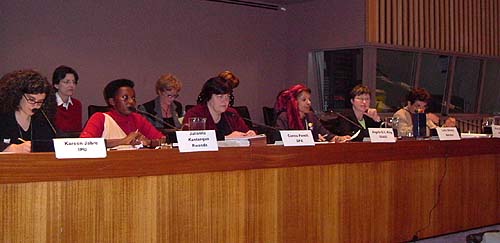 "Enhancing women's participation in electoral processes in post-conflict countries" Panel discussion at the 48th session of the Commission on the Status of Women The panel discussion held on 3 March 2004, at the United Nations Headquarters in New York, was organized by the Permanent Mission of Norway to the United Nations, the Inter-Parliamentary Union (IPU), and the Office of the Special Adviser on Gender Issues and Advancement of Women. Ms. Angela E.V. King, Special Adviser on Gender Issues and Advancement of Women, moderated the event. In her opening statement, she recalled the recent expert group meeting on "Enhancing women's participation in electoral processes in post-conflict countries" and its important findings and emphasized the crucial need for women to participate fully in all aspects of peace processes and post-conflict reconstruction. Ms. Amal Sabbagh, the Rapporteur of the expert group meeting, opened the panel discussion by presenting the experts' recommendations (full version of the report). A member of the Rwandan Parliament, Ms. Julianna Kantengwa, presented first-hand experience on being an elected official. She argued that electoral laws must contain clear safeguards to promote and protect women's participation, and building coalitions among women's groups while lobbying the men who lead opinion, are among the lessons-learned form the Rwandan experience. Ms. Laila Dåvøy, Norwegian Minister of Family and Children's Affairs, shared the experiences of Norway in increasing women's participation in politics and the kind of support her country has been offering to post-conflict countries in this regard. She also argued that "a real and well-functioning democracy cannot be built without the participation of half of its population-its women". Ms. Kareen Jabre, manager of the program for the promotion of partnership between women and men at the Inter-Parliamentary Union (IPU), illustrated the obstacles and challenges faced by women elected to Parliament in post-conflict countries and shared the experience of the Inter-Parliamentary Union in providing technical assistance to a number of parliaments. Ms. Carina Perelli, Director of the Electoral Division Assistance Division, Department of Political Affairs, emphasized the important role women can play in the reconstruction phase of a country. The participation of women, however, calls for political will, skills and awareness that women are indeed actors. Durable and sustainable peace in post-conflict societies, she furthered argued, requires a multifaceted approach. Solutions must be holistic and customized to the reality of the country. It is important to emphasize that The Commission on the Status of Women adopted agreed conclusions on women's participation in elections. In this regard, "The Commission on the Status of Women calls on Governments, as well as all other relevant participants, to:
|